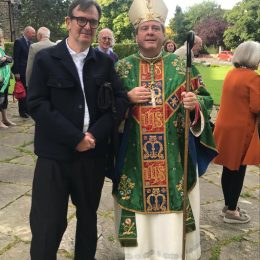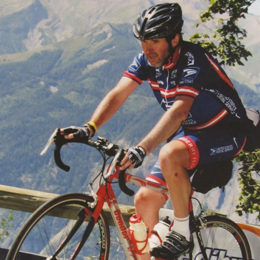The personal website of David Halpin
The Contrarian Online
“Marx was totally wrong”
“Socialism is dystopian nonsense”
“The EU should be given the benefit of the doubt”
“Some people read too much”
“Religious belief is at best meaningless, at worst dangerous”
“Classical music is elitist and highbrow”
“Cyclists should be licensed and made to wear helmets”
“Ireland is a country that has ideas above its station”
“Chess is a breathtakingly boring game”
If you agree with one or more of these statements, then this website probably isn’t for you, because its designer, David Halpin, thinks they are all wrong-headed.
So, unless perversely you want to be infuriated by the musings of a chess-appreciating, religiously interested, Marxist Eurosceptic Irishman, who loves riding his bike and listening to classical music and collecting and reading good books, now is the moment to stop exploring it.
On the other hand, if you’re still keen to look further, why not get ready for the experience by clicking a selection of the following chapters which explain why I hold the views I do:



About David Halpin
The blurb on the back cover of my self-published memoir, Keep on the Move, says I am “a father of two grown-up children, a member of the British and Irish Labour Parties, a Friend of the Wigmore Hall and an Emeritus Professor of Education”.
This indicative statement condenses into under thirty words much of what is worth knowing about me: that I am a proud and loving parent, committed Leftist, involved with Ireland, of which I am a knowledgeable citizen, passionate appreciator of classicall, especially piano, music, and a one-time university academic, specialising in the philosophy of teaching and learning.
What it misses out are two hobbies to which I devote lots of time – playing chess and riding a bike – and my churchmanship, which is centred on St Wilfrid’s anglo-catholic church in Harrogate. This church’s architecture and liturgy can be read about on the ‘Church’ page of this website.
Also omitted is any reference to Kathryn Brownridge, my partner and helpmate, with whom I happily live in Kirk Deighton, a small village located near Wetherby in North Yorkshire.
The photographs positioned nearby illustrate several key aspects of my biography – as a churchman, a teacher, and a biker.
One portrays me with the Bishop of Wakefield, The Rt Rev’d Tony Robinson, shortly after my Confirmation service at St Wilfrid’s in September 2020; another shows me with a group of school children in China in November 2011; and a third depicts me riding up the road to Alpe d’Huez in July 2006.


Most of these aspects of my life feature in the writings that make up the different pages of this website, which also include information on and abstracts of some of the better items I have published over the years – mostly as books and articles in journals.
By its nature, much of this material is dated, which is why I have supplemented it with examples of unpublished essays – work in progress about a variety of topics.
There is also a weblog – First Thoughts – where I offer comment from time to time on events in the news and other things that interest me, including what I have recently been up to and thinking about. This page of the website has been neglected for over two years, from May 2020. Re-engagement with it began on September 2024
Purpose
My chief aim in pulling together this material, following Michel de Montaigne’s  sentiment expressed at the start of his famous (1580) Essays, is to commend “some features of my habits and temperament which I consider worth knowing about”, clarifying how I want to be recognised, particularly by my son and daughter and other individuals with whom I have close personal relationships, each of whom has inevitably an incomplete comprehension of what I amount to.
sentiment expressed at the start of his famous (1580) Essays, is to commend “some features of my habits and temperament which I consider worth knowing about”, clarifying how I want to be recognised, particularly by my son and daughter and other individuals with whom I have close personal relationships, each of whom has inevitably an incomplete comprehension of what I amount to.
This process involves sharing opinions apropos of matters that mean a lot to me – political, social, religious, musical and literary.
This website is thus best thought of as a personal thought experiment, with my own writings at its heart. It’s also a kind of archive into which I have deposited material that will survive me after I am dead.
The American novelist and essayist Toni Morrison once said “writing is a way of thinking . . . about things that are disparate, unresolved, mysterious and problematic”.
I agree with that. And with Toni’s contemporary, Joan Didion, who similarly said: “I write entirely to find out what I’m thinking, what I’m looking at, what I see and what it means.”
Reading serious literature helps too, of course, as I make clear in ON READING TO WRITE .
Indeed, reading, writing and listening to music, conjoined with having a religious vocation, are how I experience my experience, each enabling me to get myself into some kind of personal order, helping to foster in my imagination a clearer sense of who I am, where I presently stand, and the place I want to journey to.
My destined political mood however is unlikely to deviate much, if at all, from the left-leaning one to which now I passionatly subscribe.
And nor will it more generally, for I feel under no pressure to prove anything to anyone other than God, being quietly satisfied that what overall I’ve accomplished in my long life up to now adds up to something that is more than just good enough. I am not the embodiment of perfection, of course. But neither I am its opposite.
Throughout my life I have self-consciously tried my best to do my best – to live up to the vocation gifted me by God to enact his will in my dealings with the world and with the people I meet on the way.
If I have a philosophy of life, that’s it – to live it in such a manner that I am better able, day by day, to bridge better the gap between God’s calling to contribute to the common good and my weaknesses of moral intention and action that cause too me to make a mess of things.
Left-leaning
Ideologically, this has led me to believe that government should always push the limits of what can be achieved, which means I do not subscribe to the idea that politics is the art of the possible.
Such a conception of the political process, the origins of which are rightist, I regard as hopelessly unambitious, given the huge problems we face, both in society and globally.
On occasions, I suspect such pragmatism, leavened with incrementalism and terms like ‘balance’ and ‘proportionality’, is really a way to justify the promotion of policies that leave things much as they are, despite the fact that it’s obvious certain of them should be challenged head-on and radically and speedily altered. Child poverty, for example, can’t be negotiated with. Nor can the ecological and life-threatening impacts of climate change.
Politics then should be about seeking instead the impossible; or what I have described elsewhere as a socialist utopia, which I regard as a much-needed alternative to the regularly dysfunctional political orthodoxies which the institutions of liberal democracy too easily take for granted, even thinking they should be universalised.
Like my literary hero, William Hazlitt, the 19th Century English essayist and journalist, I am then a Left-wing dissenter, which means, after him, I am prone “to speak my mind, bluntly and honestly”, making me “a secret disturber of the peace”.
I am then a Left-wing dissenter, which means, after him, I am prone “to speak my mind, bluntly and honestly”, making me “a secret disturber of the peace”.
And, similar to Hazlitt, I never follow the herd or jump on bandwagons; rarely accept official versions; and instinctively side with underdogs.
I also don’t have much time for those who mostly just theorize about politics. Armchair analysts thus rarely impress me, despite being a Labour Party activist who studies political theory and who keeps up to date with political events and opinion, as these apply to both the UK and elsewhere in the world, particularly Ireland, Italy and the USA. I like the company of similar people.
Inevitably, I prefer to hang out with divisive individuals – people that eschew self-restraint in favour of earnestly advocating alternative Leftist standpoints that take on and seek to expel the influence of the reactionary, conventional and hidebound.

Towards utopia
Accordingly, unlike social democratic centrists, mixed-economy liberals, and one-nation conservatives, I consider compromise, balance and moderation to be overrated political stratagems, adopted usually as a means to frustrate or embarrass calls to effect radical change.
Insofar as I am a utopian Christian ≅socialist, I thus regard as rightist folly efforts to reach a sympathetic understanding with neoliberal financial capitalism, entirely because its inexorable logic, entailing the pursuit of private profit over collective well-being, occasions resource wars, global warming, gross inequalities of income and wealth and periodic economic crises.
So, rather than accommodate and sustain the ideal of society as a kind of universal market, which is the way of many social democrats I know, I hold to the contrary view that it must be replaced by something altogether different, specifically a mode of social life that is characterised by fairness, equality, cooperation and the promotion of the common good. 
I’m also, unlike the British Labour Party to which I belong, a champion of a ‘degrowth’ political economy that promotes less GDP in favour of societal well-being. Social democrats think the latter is enabled by market economics. History has proved them wrong.

Route map
Navigating around this website should present few problems. Although the titles of its different pages are self-explanatory, each includes a short introductory scene-setting note.